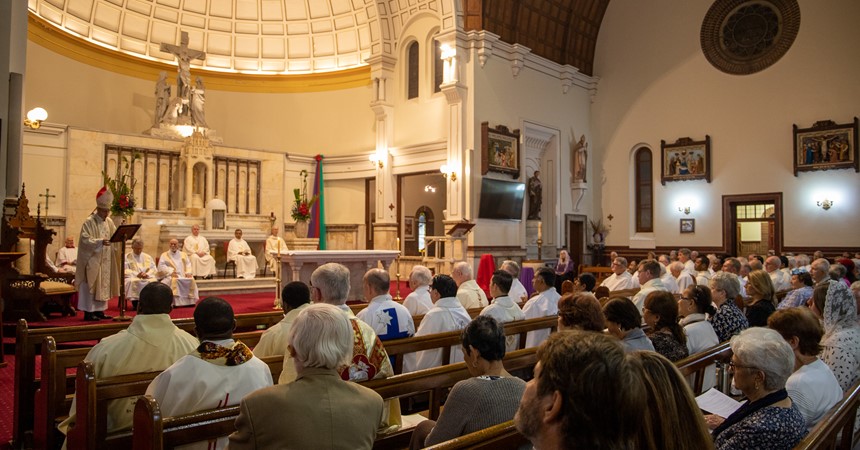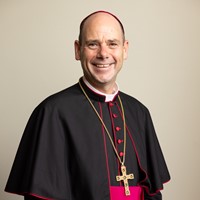I think like many of you who participate in Sunday Mass, I appreciate a good homily. For me a good homily grabs me, shakes me, and inspires me to be and live better according to the light of the gospel. A good homily does that by linking the scripture in which God speaks to us, with life here and now. A good homily deepens my faith. It leads me into important ‘aha moments’ and calls me to missionary discipleship. In other words, a good homily affirms our long held Catholic understanding: ‘Lex orandi, Lex credendi, Lex vivendi’ or in English – As we worship, so we believe, and so we live!
On Sunday 8 October I found myself engaged and challenged by Bishop Michael’s homily. And no, I am not being paid for this ‘advertisement’! Amongst many things, the homily opened up and brought clarity to the often vexed question of the relationship between Liturgy and Mission.
The readings were: Isaiah 5:1-7, Psalm 80, Philippians 4:6-9 and Matthew 21:33-43. They were all about a vineyard and the imperative to produce fruit.
What follows is a slightly edited version of Bishop Michael’s homily:
“Let me sing to my friend the song of his (the Lord’s) love for his Vineyard.” Isaiah’s famous Song of the Vineyard in today’s First Reading is a metaphor for the relationship between God and his people. It’s an image that occurs frequently throughout the Scriptures, as the People of Israel considered themselves to be especially cared for and nurtured by God just as a winemaker tends to his choice vineyard.
“What could I have done for my vineyard that I have not done?” asked both the winemaker and The Lord. The winemaker dug the soil, cleared the stones, planted choice vines, built a tower, and dug a press. The Lord freed his people from slavery in Egypt; gave them the promised land; made them a nation; gave them the wisdom of the law; and sent them the prophets to instruct and encourage them.
And most importantly, Isaiah tells us, he “loved his vineyard”. What more could he have done, only to have it yield him sour grapes. The Lord cultivated his people so that they would bear good fruit and make him, and his goodness and love known throughout the world. But having received such care, attention, and love from the Lord, Israel’s history was largely one of bloodshed and rebellion.
Between the time of Isaiah and the time of our Lord Jesus, things had gotten worse. The prophets sent by God to call the people back to justice, mercy, and love, were continually rejected, maltreated, and sometimes even killed. So, in Jesus Parable of the Vineyard which builds upon Isaiah’s Song of the Vineyard the servants sent to collect the grapes are treated the same way – they are thrashed, stoned, and killed. Like the landowner in the parable, God then sends his own Son to give Israel one last chance, but “they seized him, threw him out of the vineyard, and killed him” – on a cross on Mount Calvary.
The chief priests and the elders to whom Jesus directed his parable thought they were yielding good fruit because they kept observing all the small details of God’s law and because they kept coming to the temple to make their offerings and sacrifices to God. But they were not making God’s love and mercy known to the world. And that’s the fruit he wanted! Jesus concludes his parable saying, “I tell you then, that the Kingdom of God will be taken from you and given to a people who will produce its fruit.”
Elsewhere in the Prophet Isaiah (1:13-17) we read, the Lord said: “I have had enough of your burnt offerings … they have become a burden to me … your hands are full of blood. Wash yourselves, make yourselves clean; remove the evil of your doings from before my eyes; cease to do evil, learn to do good; seek justice, correct oppression; defend the orphan, plead for the widow.” These are the grapes the Lord wanted them to bear, but they didn’t, so the vineyard - the Kingdom - has now been given to us to produce its fruit.
Unless we realize that this Parable is also directed to us, we have not heard it properly. Yes, we the Church, the new People of God, are the one’s to whom the vineyard is now entrusted to bear fruit for the Kingdom of God by making Jesus Christ and the love and mercy of God known to the whole world.
But perhaps we are also just a bit too much like the chief priests and elders to whom Jesus addressed this parable. We are the faithful one’s who continue to come to Mass every Sunday to listen to the Word of God and offer ourselves and our sacrifice to him. By and large, but with a few mistakes, we probably also observe the details of God’s law. As important as these things are, they are not the fruit that God desires from us. Mass, the other sacraments, the Scriptures, the moral law of God – these are some of the things with which Jesus nourishes and cultivates us so that we will bear him the fruit he desires: lives of goodness, justice, mercy, and love, and making him and his name known to the world.
Let me be clear. Coming to Mass is hugely important, but it’s not the fruit! It doesn’t make me a good Catholic. What I do in between Sunday Masses is the fruit! That’s what makes me a good Catholic. Mass is the feeding and nourishment from God; my actions throughout the week are the fruit I bear for the Kingdom.
Something you may have noticed about me is that I like good liturgy, and I’m sure you do too. We like it to be beautiful, we like it to be uplifting, we like it to be meaningful, we like it to be nourishing - because that’s one of its purposes - to feed and nourish us and keep us going for another week of bearing fruit. …
Ultimately, the beauty of our Eucharistic celebrations is not gauged by what we see, hear, and experience here, but by what happens when we are dismissed at the end of Mass. As Saint John Paul II said during the Year of the Eucharist back in 2004 “By our mutual love and, in particular, our concern for those in need (both material and spiritual) we will be recognized as true followers of Christ. This will be the criterion by which the authenticity of our Eucharistic celebrations is judged.” (Mane Nobiscum Domine 28)
Back to Louise.
Interestingly, when I came to Mass in the Cathedral that day, I had just returned from the National Liturgy Conference where Fr Andrew Doohan and I facilitated a workshop on the topic ‘Liturgy, Evangelisation and Faith Formation’. It was one of the largest workshops of the conference because across the country we are all wrestling with our understanding of the relationship between liturgy and mission. Our understanding of this relationship informs and sometimes deforms our pastoral practice. There was strong resonance between what Bishop Michael said in his homily and the content of our conference workshop.
I invite you to ponder Bishop Michael’s words and to reflect yourself and perhaps in conversation with others. The following questions may assist your reflection.
- How do you understand the relationship between liturgy and mission?
- How does your, and our, participation in the liturgy nourish you, and us, for mission?
- To what change are you being invited?
- How might a sound appreciation of the relationship between liturgy and mission invite us to reimagine some of our pastoral ministry?
You might also consider the photo chosen to accompany this piece. Central to the nature of liturgy is that it is a dialogue. A homily is both preached and heard. The full, conscious and active participation of the assembly includes intentionally listing to and receiving the homily, and reflecting on it as a word for life. And so, the photo focuses on Bishop Michael AND the Assembly.
You can listen to Bishop Michael’s homily on the livestream here. Scroll forward to 26:30.
Diocesan Liturgy Council Update
To keep abreast of the work of the Diocesan Liturgy Council you can review the Report published on the website after each meeting. (Click on Council News). The September report is available. The October meeting was cancelled due to the National Liturgy Conference.
Acknowledgements
Picture: © Diocese of Maitland-Newcastle. All rights reserved.
Follow mnnews.today on Facebook.


